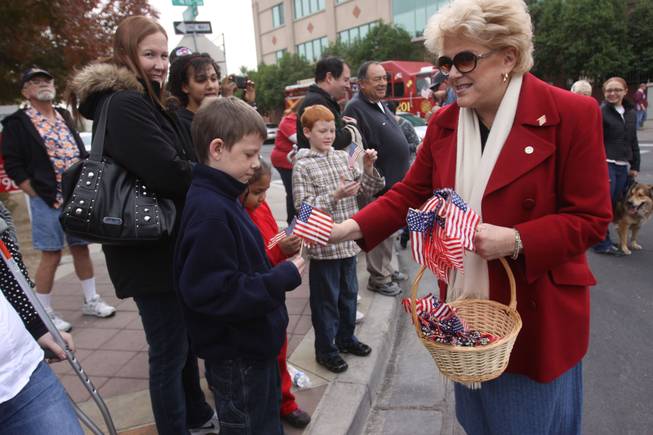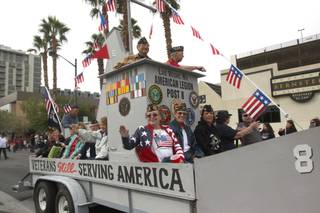
Richard Brian / Special to the Sun
Las Vegas Mayor Carolyn Goodman hands a flag to Taylor Cochran, 11, during the annual Veterans Day parade on 4th Street in downtown Las Vegas on Friday Nov. 11, 2011.
Saturday, Nov. 12, 2011 | 2 a.m.
Sun Topics
Vintage jeeps and transport vehicles rolled through downtown Las Vegas on Friday morning, carrying veterans of wars stretching back to World War II. High school marching bands played patriotic tunes while spectators along 4th Street smiled, clapped and waved, visibly thankful for the military service of the men and women of all ages.
A pair of veterans advocates, Charles Baker and Frank Ventura, stood along a sidewalk and savored the support of the thousands who lined the streets for the city’s annual Veterans Day Parade.
Yet Baker and Ventura, both of whom served in the Gulf War, couldn’t help but think of a problem plaguing U.S. veterans of the wars in Iraq and Afghanistan — chronically high unemployment — and wonder what it says about the depth of the nation’s commitment to its former servicemen and servicewomen. Nationally, the youngest recent veterans — those ages 18 to 24 — had a 30.4 percent jobless rate in October, compared with 15.3 percent for non-veterans of the same age group, said Bloomberg Businessweek, which analyzed Bureau of Labor Statistics data. For black veterans ages 18 to 24, the figure was 48 percent nationwide. Overall, the national unemployment rate for Iraq and Afghanistan veterans was 12.1 percent in October vs. 9 percent for the entire nation.
Baker and Ventura say recent veterans face multiple barriers in finding employment, especially the youngest of the group. The workplace has changed for many of the veterans who served multiple tours overseas. Technology and software are new and often unfamiliar to them. A significant portion do not know how to write a resume or have never experienced a job interview. Veterans younger than 21 — and there are 20-year-old vets — are too young, according to Nevada state laws and local regulations, to work as bartenders or security guards who carry weapons, or as a certified licensed repair person of air conditioning and heating equipment in the Las Vegas region.
“They can’t do work they were trained to do,” said Baker, the southwest regional vice president of the Fleet Reserve Association, a congressionally chartered nonprofit organization that represents the interests of veterans of the Navy and Marines. “Our laws have to be amended so they can find work.”
He argues that state and local political leaders and public policymakers in Nevada need to create advisory panels filled with veterans of all ages, raising awareness of the challenges former military personnel face as they return to Southern Nevada. Ventura agrees.
“The problem that’s going on here in Nevada is you’ve got one job opening and 500 people applying for it,” he says. “That puts returning veterans at a disadvantage.”
During the parade, Nevada Sen. Dean Heller spoke of his support for Thursday’s Senate vote that saw members of both parties overwhelmingly support an Obama administration measure aimed at easing unemployment among veterans. The initiative would create a $5,600 tax credit for businesses hiring any veteran who has been out of work six months or more and a $2,400 credit for veterans who have been unemployed for more than four weeks. Critics of the proposal, which now awaits consideration in the House of Representatives, note that businesses actually have to hire veterans in order to qualify for the tax credit. That’s a tall order in a state and nation where large- and small-business operators are reluctant to hire new workers amid continued economic uncertainty. So Heller, a conservative Republican, was asked whether he would support a stimulus-style spending package to create jobs for returning vets. The answer was no. “Stop and think about the math problem we have in this country,” he said. “We need to match revenues with expenditures.”
Nevada Assembly Speaker John Oceguera, a Democratic candidate for one of Southern Nevada’s three U.S. House seats, stood nearby. “The only thing we need to be concentrating on is jobs,” he said. “These are heroes, and we should do everything we can to help them.”
Asked whether he would support a stimulus-style measure to create jobs for returning veterans, Oceguera said “we should give (tax) incentives to employers so they hire returning vets.” Asked whether “stimulus” was a bad word in today’s political environment, Oceguera closed his mouth tightly and nodded.
Meantime, Baker and Ventura pondered the potential for the creation of jobs for returning veterans. They were matter-of-fact rather than bitter. Their tone reflected frustration, not anger.
“Everyone says the right thing,” Baker said, “but we have veterans who are being forgotten about.”


Join the Discussion:
Check this out for a full explanation of our conversion to the LiveFyre commenting system and instructions on how to sign up for an account.
Full comments policy